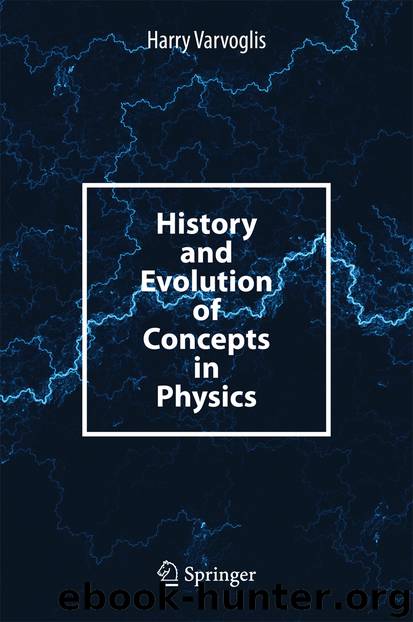History and Evolution of Concepts in Physics by Harry Varvoglis

Author:Harry Varvoglis
Language: eng
Format: epub
Publisher: Springer International Publishing, Cham
4.4.3 Experimental Foundations of Electromagnetism: Faraday
After the announcement of Ampère’s experimental results, many physicists tried to explore in depth the new phenomena. Nobody, however, could match the scope and depth of Faraday’s research work, who was undoubtedly the greatest experimental physicist of the 19th century and one of the best ever. That was a great achievement, especially in view of the fact that Faraday never attended college or even high school and that the only training he ever received in science was in chemistry by his mentor, Davy, who was also self-educated!
Michael Faraday was born in 1791 in the outskirts of London. At the age of thirteen he left school and began to work in a bookbinder’s shop, where he had the opportunity to read many books. One of the customers noticed the young man’s love for learning and offered him some tickets for attending a series of lectures given by the great chemist and director of the Royal Institution, Humphrey Davy. At that time, when the opportunities for entertainment were few, one had to buy a ticket to attend lectures given by a famous scientist, so the invitations were greatly appreciated. Young Faraday attended all lectures, keeping notes. When the series of lectures was completed, he bound the notes in two volumes and offered them to Davy. Davy was so impressed by the studiousness and systematic mind of the young man that hired him as his assistant. At first, Faraday’s duties seemed more like those of a servant. But the new assistant was a good student and he quickly became indispensable in Davy’s research. Eventually, he succeeded his teacher at the Royal Institution, where he stayed as professor of chemistry for 40 years (from 1825 until 1865, when he resigned). During most of his research career Faraday worked mainly in chemistry. So, it should not come as a surprise that chemists consider Faraday as a chemist. Among Faraday’s discoveries in chemistry are benzene, tetrachlorethylene (a solvent used in dry cleaning) and nitrogen triiodide (an extremely sensitive explosive; a fly walking on it can trigger its explosion). However, Faraday’s work in physics was more important. He worked on the liquefaction of gases and realized the importance of the critical temperature above which a gas cannot be liquefied, no matter how much one compresses it. Very important was also his work on electrolysis; besides the introduction of the concept of the chemical equivalent, and the laws of electrolysis, he coined all relevant to the subject new scientific terms, such as electrolyte, electrode, anode, cathode, anion, cation, etc.
However, Faraday’s main contribution to physics was the experimental foundation of electromagnetism, on which was later based Maxwell to formulate the theoretical–mathematical description of this branch of physics. This task took Faraday about ten years, from 1830 until 1839. He first attempted to confirm the reasonable assumption that, since an electric current produces a magnetic field, a magnetic field should produce an electric current. This “association” resulted from the fact, as mentioned in what follows, that Faraday used to think by analogies.
Download
This site does not store any files on its server. We only index and link to content provided by other sites. Please contact the content providers to delete copyright contents if any and email us, we'll remove relevant links or contents immediately.
Sapiens: A Brief History of Humankind by Yuval Noah Harari(14358)
Sapiens by Yuval Noah Harari(5363)
Pale Blue Dot by Carl Sagan(4994)
Homo Deus: A Brief History of Tomorrow by Yuval Noah Harari(4897)
Livewired by David Eagleman(3762)
Origin Story: A Big History of Everything by David Christian(3680)
Brief Answers to the Big Questions by Stephen Hawking(3421)
Inferior by Angela Saini(3310)
Origin Story by David Christian(3192)
Signature in the Cell: DNA and the Evidence for Intelligent Design by Stephen C. Meyer(3123)
The Gene: An Intimate History by Siddhartha Mukherjee(3091)
The Evolution of Beauty by Richard O. Prum(2992)
Aliens by Jim Al-Khalili(2824)
How The Mind Works by Steven Pinker(2811)
A Short History of Nearly Everything by Bryson Bill(2681)
Sex at Dawn: The Prehistoric Origins of Modern Sexuality by Ryan Christopher(2513)
From Bacteria to Bach and Back by Daniel C. Dennett(2477)
Endless Forms Most Beautiful by Sean B. Carroll(2471)
Who We Are and How We Got Here by David Reich(2430)
